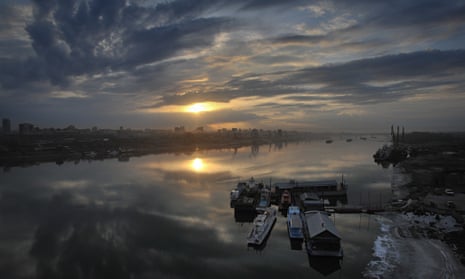“Why Siberia?” is a question that I’ve grown quite used to hearing. That any sane person should want to live here is a fact met with incredulity by Brits and Russians alike. It’s imagined by westerners as a land of darkness, harsh winters, bears and exiles, and it’s a home seldom coveted by foreigners.
Then again, I’ve not had the most typical of bucket lists. My childhood interests in the eastern bloc have taken me from Pyongyang to Chernobyl and Beijing to Belgrade. I’ve stood at the tombs of despots: Kim Il-sung and Kim Jong-il, Mao and Tito. While some might see my khruschyovka – a cheap and hastily erected 1960s Soviet apartment block – as a grey eyesore, I can remember timidly exploring the gutted examples in Pripyat, near Chernobyl, in awe.
It may be true that our building’s stale corridor has chipped concrete and peeling paint, and that my bathroom is indeed missing a sink, and perhaps I do sleep on a sofa. But I couldn’t be happier about having seized, somewhat impulsively, the chance to travel to places I’ve always wondered about.
Novosibirsk, Russia’s third city, sits roughly between Kazakhstan and Mongolia, deep in the Russian interior. It’s situated on a latitude similar to Newcastle and, barring the lack of humidity, the climate doesn’t seem particularly different to home in the tamer months. Despite the slight resemblance to Pyongyang, this is a modern city. Though the trams and metro trains may be up to 60 years old, this remains the last city on the Trans-Siberian railway where you’ll have reliable access to all the facilities of modern life. Both Burger King and KFC stand proudly on Red Avenue and the Irish pubs serve British beer on tap. Imported Japanese cars, which are commonplace, share the streets with the Ladas and Volgas. Some people even claim the tap water is safe to drink.
How I got here isn’t the simplest of stories. I still recall, some years ago in Kiev, jolting up and down on my seat inside a speeding marshrutka (a kitschy type of shared taxi particular to ex-Soviet states) desperately trying to solicit some directions to my hostel, located near the city’s main station. My rather poor Russian meant I could hardly muster more than: “Help! My hotel! My hotel big train station!” It’s quite understandable why the old women sharing the cab were a tad bemused.
Still, my experiences in Ukraine were encouraging. It was the first former Soviet city I’d visited. There was a mixed blessing in that my trip coincided with the start of November 2013’s Euromaidan demonstrations, and I meandered around like a clueless tourist questioning as many people as I could inside the occupied government buildings.
After some months in London studying Russian at an elementary level, working menial jobs to pay my way, I jumped at the chance to head out to Russia and start learning the language intensively. I settled on a language school, and had to choose between Russia’s cultural capital, St Petersburg, or the hitherto unknown Novosibirsk. I figured the latter would be removed from “European Russia”, with its more international inhabitants, and so I chose it without hesitation.
I found myself thrust into a new world, where shop- and kiosk-owners seem perpetually miserable, smiles are altogether absent and people never tire of staring. I was soon made aware that Russians judge he who smiles without reason to be a fool, and I was quick to learn that the people value forthrightness: I asked one friend why it isn’t customary here to thank motorists who stop when you cross a road. His answer was simply: “Why should you thank someone for not killing you?”
Perhaps I might be painting the Russians as a rude lot. But doesn’t a reluctance to thank others frequently grant the word a new sanctity? In a country where people believe that an overuse of manners dilutes their meaning, the British custom of barraging others with pleases and apologies seems disingenuous and indirect.
To their credit, I’ve found Siberians to be a generally straightforward and honest lot. You can learn to value the fact that they won’t hesitate to tell you what they think, and you’ll quickly know where you stand with them. At its best, this can mean that you will always know that your pals truly have your back, and there are no people who make more faithful friends. The people in Novosibirsk see themselves as a contrast to the fast-movers and crowds of far-off Moscow.
For me, adjusting to the Siberian mentality and philosophy has clearly demonstrated the value in travelling to countries with different values from your native land. It’s possible to check your principles, and see your own habits and even your supposed national character in a different light. You may not share my obsession for the Russosphere or North Korea, but I would nevertheless suggest that anyone who ever entertains the notion, however briefly, of going off the beaten track should follow through with it.
